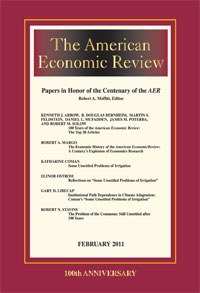
Baillon, A., l'Haridon, O. and Placido, L. (2011). Ambiguity Models and the Machina Paradoxes American Economic Review, 101(4):1547--1560.
-
Affiliated authorAurélien Baillon
-
Publication year2011
-
JournalAmerican Economic Review
Machina (2009) introduced two examples that falsify Choquet expected utility, presently one of the most popular models of ambiguity. This article shows that Machina's examples falsify not only the model mentioned, but also four other popular models for ambiguity of the literature, namely maxmin expected utility, variational preferences, ¿-maxmin, and the smooth model of ambiguity aversion. Thus, Machina's examples pose a challenge to most of the present field of ambiguity. Finally, the paper discusses how an alternative representation of ambiguity-averse preferences works to accommodate the Machina paradoxes and what drives the results.